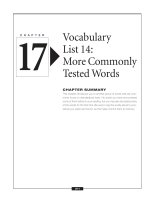Vocabulary List 1 - Prefixes
Bạn đang xem bản rút gọn của tài liệu. Xem và tải ngay bản đầy đủ của tài liệu tại đây (115.99 KB, 14 trang )
I
n order to be able to unlock the meaning of many words in the English language, it is useful for you to under-
stand what a prefix is. A prefix is a word part at the beginning of a word that changes or adds to the mean-
ing of the root word in some way. By learning some common prefixes, you will be able to decipher the
meaning of many words that are unfamiliar to you. After you have completed the exercises in this chapter, you
will become acquainted with the meanings of the more common prefixes, which will improve your reading, speak-
ing, and listening vocabularies.
CHAPTER
Vocabulary List 1:
Prefixes
CHAPTER SUMMARY
When actors analyze a character, they break the person’s characteris-
tics down into personality, mannerisms, and appearance in order to see
what makes them tick. You do much the same thing when you analyze
a word. Breaking a new word down into its parts can help you deter-
mine its meaning.
4
31
–
VOCABULARY LIST 1: PREFIXES
–
33
1
34
2
65
7
8
9
12
11
10
14
17
15
18
19
16
13
Across
4 medical “forecast”
5 unimportant
6 avoid, elude
8 occasional
9 preexistent,
previous
11 the opposite of
promote
12 excessive
13 integration
14 inferior
17 hindsight
18 predecessor
19 sinister, venomous
Down
1 destroy
2 to exceed
3 unreadable
6 dispute, argument
7 neutral,
unprejudiced
10 general agreement
15 aversion, loathing
16 an expression for
Choose the word from the Vocabulary List that best fits into the crossword puzzle. You can check your answers
at the end of the chapter following the answers to the questions.
Vocabulary List 1: Prefixes
antecedent
antipathy
circumvent
consensus
controversy
decimate
demote
disinterested
euphemism
exorbitant
illegible
intermittent
malevolent
precursor
prognosis
retrospect
subordinate
synthesis
transcend
trivial
antecedent (an·ti·se¯d·ənt)
prefix: ante means before
(adj.)
going before in time
The VCR was a(n) to the DVD player.
antipathy (
an
·
tip
·ə·
th
e¯)
prefix: anti means against
(noun)
revulsion, any object of strong dislike
I have a severe toward cockroaches.
circumvent (sər·kəm·vent)
prefix: circum and circ mean around
(verb)
to go around; to catch in a trap; to gain superiority
over; to prevent from happening
I tried to any ill will between my two
employees by giving them both a promotion.
consensus (kən·sen·səs)
prefix: con means with, together
(noun)
agreement, especially in opinion
The family finally reached a and decided
to adopt a dog from the pound.
controversy (kon·trə·ver·se¯)
prefix: contr means against
(noun)
a discussion of a question in which opposing views
clash
There is a in my building about whether
or not to implement a flip tax.
decimate (des·i·ma¯t)
prefix: dec means ten
(verb)
to destroy or kill a large portion of something, to
take or destroy a tenth part of something
Humans continue to the rainforest every
day.
demote (di·mo¯t)
prefix: de means down, away from
(verb)
to lower in grade or position
The company had to the vice president
due to an economic downturn.
disinterested (dis·in·tər·est·ed)
prefix: dis means not, opposite of
(adj.)
not motivated by personal interest or selfish motives
He is the most politician running for
office this term.
euphemism (
u·fə·mizm)
prefix: eu means good, well
(noun)
the use of a word or phrase that is considered less
distasteful or offensive than another
“Bachelorette” is a for “spinster.”
exorbitant (ek·zor·bi·tənt)
prefix: ex means out of, away from
(adj.)
going beyond what is reasonable and proper
The cost of real estate in the big cities
forces many people to move to the suburbs.
illegible (i·lej·ə·bəl)
prefix: il means not, opposite
(adj.)
not able to be read
Because my handwriting is , I always type
my papers.
–
VOCABULARY LIST 1: PREFIXES
–
35









